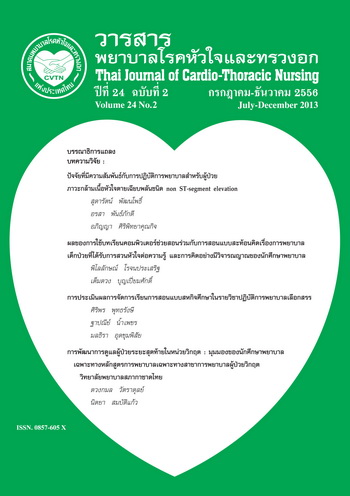การพัฒนาการดูแลผู้ป่วยระยะสุดท้ายในหน่วยวิกฤต : มุมมองของนักศึกษาพยาบาลเฉพาะทางหลักสูตรการพยาบาลเฉพาะทางสาขา การพยาบาลผู้ป่วยวิกฤต วิทยาลัยพยาบาลสภากาชาดไทย
Keywords:
ผู้ป่วยวิกฤต, การดูแลระยะสุดท้าย, พยาบาลไอซียู, การวิจัยเชิงคุณภาพ, Critically ill patients, End-of- life care, ICU nurses, Qualitative StudyAbstract
การวิจัยเชิงคุณภาพนี้มีวัตถุประสงค์เพื่อศึกษาการรับรู้ของพยาบาลในการดูแลผู้ป่วยระยะสุดท้ายใน หน่วยวิกฤต คัดเลือกผู้ให้ข้อมูลแบบเฉพาะเจาะจงจากผู้เข้ารับการอบรม หลักสูตรการพยาบาลวิกฤตที่ศึกษาในวิทยาลัยพยาบาลสภากาชาดไทย จำนวน 32 ราย เก็บข้อมูลโดยใช้การสัมภาษณ์เชิงลึกและบันทึกเทปรายบุคคล วิเคราะห์ข้อมูลโดยใช้การวิเคราะห์เนื้อหา (Content Analysis)
ผลการวิจัยพบว่า พยาบาลหน่วยวิกฤตรับรู้ลักษณะการดูแลผู้ป่วยระยะสุดท้ายเป็น 3 ลักษณะ คือ 1) ดูแลโดยขาดแนวทางการปฏิบัติอย่างเป็นรูปธรรม 2) ดูแลด้วยความคับข้องใจ 3) ดูแลตามความต้องการของ ครอบครัว ส่วนความต้องการของพยาบาลในการพัฒนาการดูแลผู้ป่วยระยะสุดท้ายมี 4 ประการ ได้แก่ 1) ส่งเสริม ให้ครอบครัวมีส่วนร่วมในการดูแลระยะสุดท้าย 2)การดูแลบนพื้นฐานของความเชื่อทางจิตวิญญาณของผู้ป่วย 3) พัฒนาแนวทางปฏิบัติในการดูแลผู้ป่วยระยะสุดท้ายโดยทีมสุขภาพมีส่วนร่วม และ 4) พัฒนาศักยภาพพยาบาล ไอซียูในการดูแลผู้ป่วยระยะสุดท้าย
ข้อเสนอแนะ: การศึกษานี้ได้ข้อมูลที่สำคัญเพื่อพัฒนาคุณภาพดูแลผู้ป่วยระยะสุดท้ายในด้านการพัฒนาแนวทางในการปฏิบัติที่เหมาะสม รวมทั้งการจัดทำหลักสูตรเพื่อพัฒนาศักยภาพพยาบาลในการดูแลผู้ป่วยระยะสุดท้ายในหน่วยวิกฤต
Improving Nursing Care for Critical Patients
with Terminal Illness : Perspectives of Critical Nursing
Students of the Thai Red Cross College of Nursing
The purpose of this qualitative study was to explore nurses’ perceptions of end-of-life (EOL) care in intensive care unit (ICU). Purposive samples of 32 ICU nurses enrolling in critical nursing specialty course at The Thai Red Cross College of Nursing. Data were collected using individual in depth interview and audio recorded. Interview transcripts were analyzed using content analysis.
The results showed that ICU nurses categorized their perceptions of providing end of life care into 3 characters: 1) caring without practical guideline, 2) caring with frustration, and 3) caring according to family caregivers’ needs. In addition, ICU nurses expressed needs to improve EOL care in 4 aspects: 1) promoting participation of EOL care among family caregivers, 2) caring based on spiritual beliefs of family caregivers, 3) develop EOL practice guideline based on health team’s participation and 4) improve capacity of EOL care in ICU nurses.
Suggestions: This study provides important information to improve the quality of end of life care by developing appropriate practice guideline including establishing curriculum to improve competency of end of life care for nurse in ICU.
Downloads
How to Cite
Issue
Section
License
บทความนี้ยังไม่เคยตีพิมพ์หรืออยู่ในระหว่างส่งไปตีพิมพ์ในวารสารอื่น ๆ มาก่อน และกองบรรณาธิการขอสงวนสิทธิ์ในการตรวจทาน และแก้ไขต้นฉบับตามเกณฑ์ของวารสาร ในกรณีที่เรื่องของท่านได้ได้รับการตีพิมพ์ในวารสารฉบับนี้ถือว่าเป็น ลิขสิทธิ์ของวารสารพยาบาลโรคหัวใจและทรวงอก






